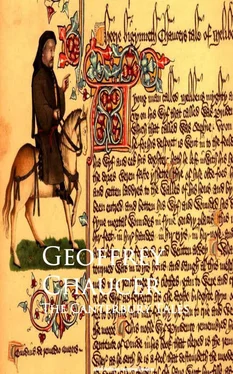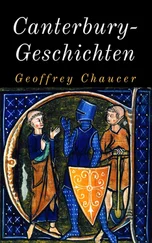For he was yong and mighty for the nones,
And ther-to be was strong and big of bones
1425
To doon that any wight can him devyse.
A yeer or two he was in this servyse,
Page of the chambre of Emelye the brighte;
(570)
And 'Philostrate' he seide that he highte.
But half so wel biloved a man as he
1430
Ne was ther never in court, of his degree;
He was so gentil of condicioun,
That thurghout al the court was his renoun.
They seyden, that it were a charitee
That Theseus wolde enhauncen his degree,
1435
And putten him in worshipful servyse,
Ther as he mighte his vertu excercyse.
And thus, with-inne a whyle, his name is spronge
(580)
Bothe of his dedes, and his goode tonge,
That Theseus hath taken him so neer
1440
That of his chambre he made him a squyer,
And yaf him gold to mayntene his degree;
And eek men broghte him out of his contree
From yeer to yeer, ful prively, his rente;
But honestly and slyly he it spente,
1445
That no man wondred how that he it hadde.
And three yeer in this wyse his lyf he ladde,
And bar him so in pees and eek in werre,
(590)
Ther nas no man that Theseus hath derre.
And in this blisse lete I now Arcite,
1450
And speke I wol of Palamon a lyte.
1424. E. Cm. long; rest strong. 1431. E. Hl. ins. his after of. 1441. E. Hn. Cp. gaf.
In derknesse and horrible and strong prisoun
This seven yeer hath seten Palamoun,
Forpyned, what for wo and for distresse;
Who feleth double soor and hevinesse
1455
But Palamon? that love destreyneth so,
That wood out of his wit he gooth for wo;
And eek therto he is a prisoner
(600)
Perpetuelly, noght oonly for a yeer.
Who coude ryme in English proprely
[43: T. 1462-1497.]
1460
His martirdom? for sothe, it am nat I;
Therefore I passe as lightly as I may.
1454. E. Hn. Pt. soor; Cp. Ln. sore; Cm. Hl. sorwe. E. om. and.
It fel that in the seventhe yeer, in May,
The thridde night, (as olde bokes seyn,
That al this storie tellen more pleyn,)
1465
Were it by aventure or destinee,
(As, whan a thing is shapen, it shal be,)
That, sone after the midnight, Palamoun,
(610)
By helping of a freend, brak his prisoun,
And fleeth the citee, faste as he may go;
1470
For he had yive his gayler drinke so
Of a clarree, maad of a certeyn wyn,
With nercotikes and opie of Thebes fyn,
That al that night, thogh that men wolde him shake,
The gayler sleep, he mighte nat awake;
1475
And thus he fleeth as faste as ever he may.
The night was short, and faste by the day,
That nedes-cost he moste him-selven hyde,
(620)
And til a grove, faste ther besyde,
With dredful foot than stalketh Palamoun.
1480
For shortly, this was his opinioun,
That in that grove he wolde him hyde al day,
And in the night than wolde he take his way
To Thebes-ward, his freendes for to preye
On Theseus to helpe him to werreye;
1485
And shortly, outher he wolde lese his lyf,
Or winnen Emelye un-to his wyf;
This is theffect and his entente pleyn.
1470. Hl. ȝiue; E. yeue. 1472. E. Of; rest With. 1477. E. moot; rest moste, most, muste. 1479. E. Hn. Cm. thanne; rest than.
(630)
Now wol I torne un-to Arcite ageyn,
That litel wiste how ny that was his care,
1490
Til that fortune had broght him in the snare.
1488. E. Hn. Ln. to; rest vn-to.
The bisy larke, messager of day,
Saluëth in hir song the morwe gray;
And fyry Phebus ryseth up so brighte,
That al the orient laugheth of the lighte,
1495
And with his stremes dryeth in the greves
[44: T. 1498-1532.]
The silver dropes, hanging on the leves.
And Arcite, that is in the court royal
(640)
With Theseus, his squyer principal,
Is risen, and loketh on the myrie day.
1500
And, for to doon his observaunce to May,
Remembring on the poynt of his desyr,
He on a courser, sterting as the fyr,
Is riden in-to the feeldes, him to pleye,
Out of the court, were it a myle or tweye;
1505
And to the grove, of which that I yow tolde,
By aventure, his wey he gan to holde,
To maken him a gerland of the greves,
(650)
Were it of wodebinde or hawethorn-leves,
And loude he song ageyn the sonne shene:
1510
'May, with alle thy floures and thy grene,
Wel-come be thou, faire fresshe May,
I hope that I som grene gete may.'
And from his courser, with a lusty herte,
In-to the grove ful hastily he sterte,
1515
And in a path he rometh up and doun,
Ther-as, by aventure, this Palamoun
Was in a bush, that no man mighte him see,
(660)
For sore afered of his deeth was he.
No-thing ne knew he that it was Arcite:
1520
God wot he wolde have trowed it ful lyte.
But sooth is seyd, gon sithen many yeres,
That 'feeld hath eyen, and the wode hath eres.'
It is ful fair a man to bere him evene,
For al-day meteth men at unset stevene.
1525
Ful litel woot Arcite of his felawe,
That was so ny to herknen al his sawe,
For in the bush he sitteth now ful stille.
1491. day] Hl. May. 1495. E. hise. 1497. Hl. Arcite; rest Arcita. 1502. E. Hn. Cm. a; rest his. Cp. Pt. Ln. Hl. stertyng; E. Hn. startlynge; Cm. stertelynge. 1511. Hl. wel faire; rest om. wel. 1512. E. Hn. Cm. Hl. In; rest I. 1514. E. a; rest the. 1518. Hn. Hl. afered; Cm. ofered; rest aferd. E. ( alone ) ins. thanne bef. was. 1521. Hl. Pt. goon; Cm. Ln. gon; E. Hn. Cp. go. 1526. E. Hn. al; rest of.
(670)
Whan that Arcite had romed al his fille,
And songen al the roundel lustily,
1530
In-to a studie he fil sodeynly,
[45: T. 1533-1567.]
As doon thise loveres in hir queynte geres,
Now in the croppe, now doun in the breres,
Now up, now doun, as boket in a welle.
Right as the Friday, soothly for to telle,
1535
Now it shyneth, now it reyneth faste,
Right so can gery Venus overcaste
The hertes of hir folk; right as hir day
(680)
Is gerful, right so chaungeth she array.
Selde is the Friday al the wyke y-lyke.
1530. E. fil al: rest om. al. 1532. E. Hn. Cm. crop; Cp. Hl. Pt. croppe. 1536. E. Hn. Cm. kan; rest gan. 1538. E. gereful; Cp. geerful; Hl. grisful; rest gerful. 1539. Hl. wyke; Hn. Cp. wike; Pt. Ln. weke; Cm. wouke; E. wowke.
1540
Whan that Arcite had songe, he gan to syke,
And sette him doun with-outen any more:
'Alas!' quod he, 'that day that I was bore!
How longe, Iuno, thurgh thy crueltee,
Woltow werreyen Thebes the citee?
1545
Allas! y-broght is to confusioun
The blood royal of Cadme and Amphioun;
Of Cadmus, which that was the firste man
690
That Thebes bulte, or first the toun bigan,
And of the citee first was crouned king,
1550
Of his linage am I, and his of-spring
By verray ligne, as of the stok royal:
And now I am so caitif and so thral,
That he, that is my mortal enemy,
I serve him as his squyer povrely.
1555
And yet doth Iuno me wel more shame,
For I dar noght biknowe myn owne name;
But ther-as I was wont to highte Arcite,
700
Now highte I Philostrate, noght worth a myte.
Allas! thou felle Mars, allas! Iuno,
1560
Thus hath your ire our kinrede al fordo,
Читать дальше












